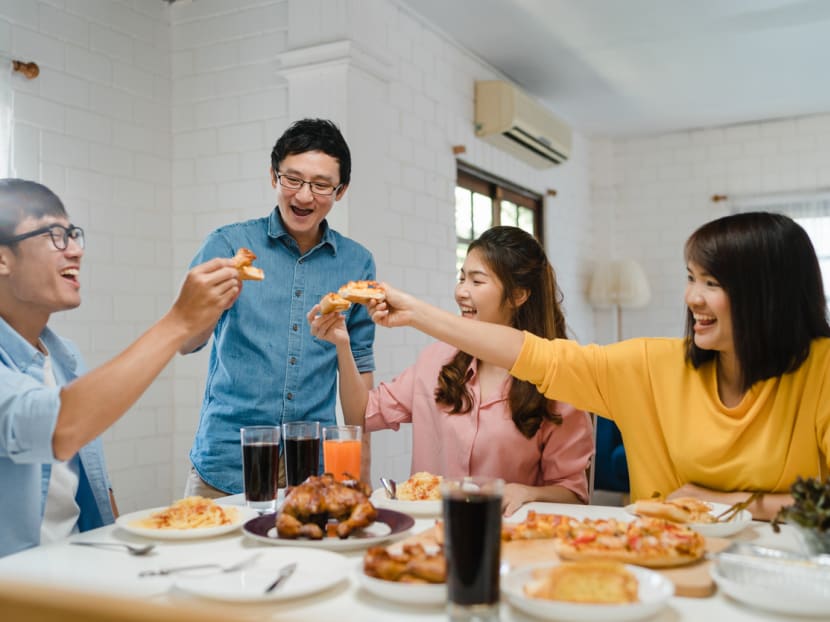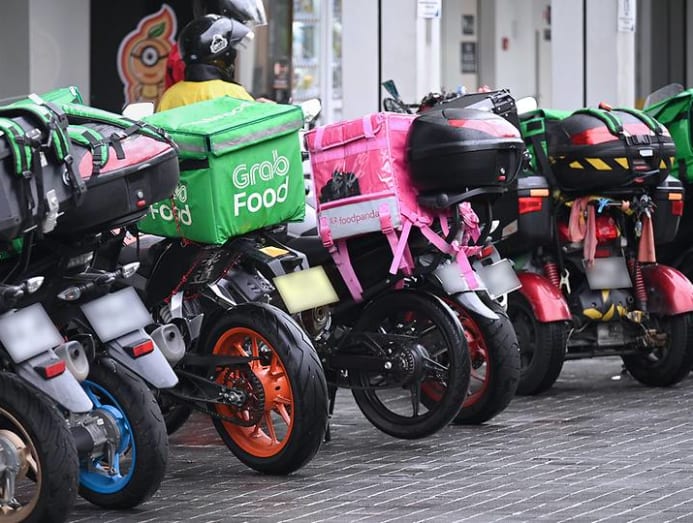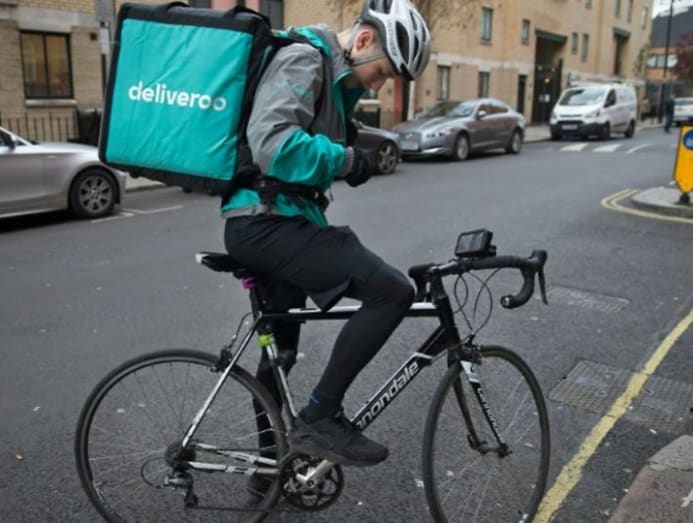Commentary: Ordering in festive feasts can be stressful so why do people still turn to food delivery apps?
The poor experiences of some during the year-end holidays aren’t turning people away from doing so for the Chinese New Year, say Singapore University of Social Sciences researchers.

Ordering in for your festive family feasts? (Photo: iStock)
SINGAPORE: How people get their food has changed dramatically during the past years, accelerated by the stay-at-home economy. The food-delivery ecosystem has become an integral part of life in Singapore.
According to a survey commissioned by Deliveroo, 80 per cent of the 1,000 respondents surveyed here said they were ordering from food deliveries more than ever before, with half admitting that they order in food more than once a week.
It’s little wonder why. With social distancing guidelines halving most restaurants’ seating capacity and pandemic FOGO (fear of going out), many have opted for holiday meals at home.
Yet F&B outlets and platforms typically experience a spike in demand during the festive season, which strains their supply chains.
On Dec 24, 2021, a long wait for pre-ordered deliveries and takeaways from Collin's Grille outlets was reported across Singapore, with some waiting for up to three hours to no avail.
Orders from Morganfield's also saw a two-to-four-hour delay on Christmas Eve in 2020.
Commonly cited causes include running out of stock, a kitchen’s inability to cope with the large volume of orders or a lack of delivery drivers
While some restaurants have learnt from past years and have steadied their supply chains, delivery platforms still struggle to match an overzealous demand for their services with delivery drivers sometimes.
The reality is that many platforms and restaurants are equipped to handle a regular volume of orders for dinner and lunches, but less so for the surge during large festive feasts, especially if half the nation turns celebrates the festival during the same days.
Yet, with all these incidents and risks, why do people still turn to food deliveries during festive seasons?
HOUSE PARTIES HAVE BEEN AROUND FOR A WHILE
The phenomenon of turning to outsourced food services when hosting parties at home dates back beyond the proliferation of food delivery apps. For special occasions like birthdays, festivities and celebrations, people would engage caterers
For casual gatherings, many turn to fast-food outlets like 4Fingers, which can churn large quantities of food out quickly.
Hence, it is not surprising people look to delivery for their festive ordering. Empowered by delivery apps and the digitalisation movement, people now have a wider variety of choices to select from.
Yet there is one clear difference from the past: Not all options are equipped to accept large orders, which comes with risks churning out food from satellite kitchens and working with new partners for the first time. Delays and failures in fulfillment may cause distress, frustration and potentially a loss of trust.

INERTIA AND POSITIVE BIAS
A few mishaps notwithstanding, food delivery services have been around for decades and will continue to do so due to several factors.
Working from home is great - yet the more time you spend at home, the more inertia keeps you from leaving the house.
Our psychological inertia resists change unless compelled by a strong enough motive. We default to an easy option, even if there is a better choice available.
The thought of having to get ready to head out to eat or self-collect orders – which involves juggling a great number of takeaway boxes, and getting caught in the massive festive traffic with everyone else – can cause people to feel anxious.
This perceived cost of effortful behaviour encourages the pursuit of self-indulgent pleasure and immediate gratification. Passing the stressful responsibilities of getting food to the deliverers so you can eat in the comforts of home can seem like a really good idea.
People also tend to view their past experiences through rosy glasses overall - remembering more pleasant than unpleasant events, and recalling events more favourably than they actually were - or what we call the positive bias in memory.
We might have encountered unreliable deliveries a couple of times, yet such memories tend to fade rather quickly, especially since people would probably have used the same service to order a meal for themselves the next day without hiccups.
With these constant success stories, people will simply assume that “if it works yesterday, it should work today too”, but fail to re-evaluate a situation even in the face of change.
“IT WON’T HAPPEN TO ME”
People also tend to unrealistically underestimate their personal chances of encountering negative events - what psychology terms optimism bias.
Such cognitive bias is common for both positive events (such as believing you might win the lottery and buying a ticket) and negative events (such as predicting you might experience a delay in food delivery).
In fact, research has found that people show more optimistic bias when in a positive mood. With upbeat jingles playing everywhere as shops celebrate the Chinese New Year, people are slipping into happy holiday vibes and tend not to focus on the risks of events taking a sour turn.
That nice feeling of believing that things will work out on an individual level and a potentially false belief in having more control over things than we actually do are wafting through the festive season.
Unfortunately, just like believing we’re each a better-than-average driver more skilled at manoeuvering our vehicle at dangerously high speeds, our biased estimates on the probability of negative events happening could lead to potentially risky decisions. We might host a festive party and relying solely on an untested F&B outlet on a rarely used food platform, both of which can be unreliable and without a human interface at the other end to troubleshoot and carry out service recovery immediately.
PLAN B FOR YOUR FOOD DELIVERIES
Still, we can’t live life without taking sensible risks. When disaster strikes with our food deliveries today, people do have a straightforward route to recovery today.

The convenience of food delivery platforms and the number of such available services mean that if one order lets you down, several others may save the day within an hour or two, especially if delays are caused by a specific restaurant.
In situations where the food delivery platform is responsible for the delay, turning to other platforms or restaurants with their own delivery fleet such as fast food joints can save the day.
Apart from Grab, Foodpanda and Deliveroo, options include OddleEats, which feature popular restaurants such as Astons.
Compare that to years back, where caterers who failed to turn up meant that the host had to grab a few people to run to the nearest restaurant or fast-food outlet in person to save the day.
As long as a new batch of food arrives, the disgruntlement will slowly fade once hunger among the guests is resolved.
ORDERING IN SO PEOPLE CAN SPEND TIME WITH EACH OTHER
There’s little doubt eating habits are changing. Even for regular meals, a recent Singapore Management University 2021 survey showed a significant year-on-year increase in take-aways.
People may prefer to host celebrations at home as they do not need to worry about the commuting time and the crowd in F&B outlets on festive dates.
While they might have to tolerate glitches and considerably steep service fees, that is something they are getting used to. There is nothing like focusing on the more important part of special occasions: The people around us.
While food platform services will continue to experience the occasional gaps in reliability, people will still turn to them with the pros clearly outweighing the cons. Hence, expect the Chinese New Year orders to continue.
Chong Guan is Associate Professor in Marketing and Deputy Director at the Office of Graduate Studies, Singapore University of Social Sciences.
Sean Lee is Associate Faculty at the School of Business, Singapore University of Social Sciences and Senior Consultant at Consulting Division, Kantar














